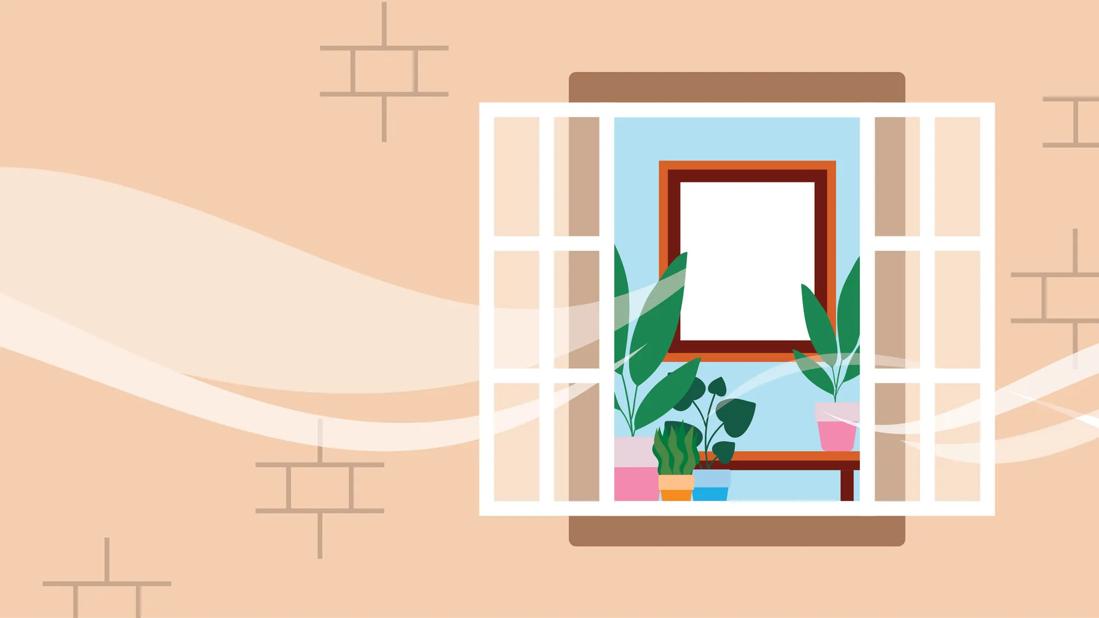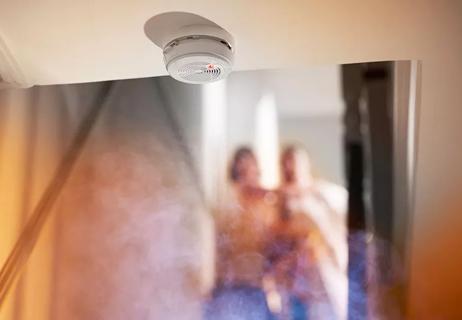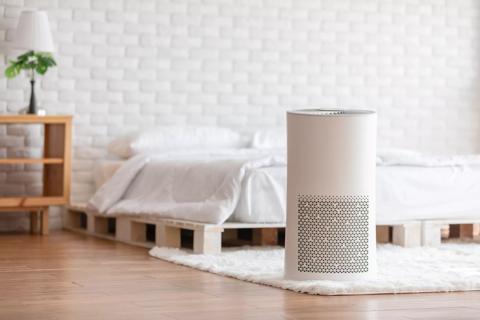Open the windows, keep a clean house and consider putting in preventive features like carbon monoxide detectors

Many of us spend so much time indoors, especially in the winter or on really hot days. When there isn’t much airflow inside, we come into contact with allergens like dust mites and mold. And they can wreak havoc on our health all year long.
Advertisement
Cleveland Clinic is a non-profit academic medical center. Advertising on our site helps support our mission. We do not endorse non-Cleveland Clinic products or services. Policy
Improving the health and quality of the air inside is just as important as getting fresh air outside. But what can you do to make sure the air inside isn’t going stale?
Pulmonologist Neha Solanki, MD, explains what could be making the air in your home unhealthy and ways you can fix it.
Indoor air quality (IAQ) describes the condition of the air you breathe when you’re inside, whether you’re at home, in the office or in any other building. Several factors can impact IAQ, including:
“Indoor air quality is perhaps the worst in winter and during extremely hot temperatures due to a lack of ventilation, when we keep our windows closed and stay inside for extended periods,” says Dr. Solanki. “But the air you breathe inside can affect your health all year.”
The air you breathe affects your entire body. Dr. Solanki explains what happens when your IAQ is poor.
Long-term exposure to poor air quality can affect your ability to take deep breaths or get enough oxygen. When you breathe in chemicals like carbon monoxide or gas, you can have difficulty breathing and can also become dizzy, faint or lose consciousness. It can even be fatal in a very short amount of time.
Advertisement
“Respiratory illnesses like the flu and respiratory syncytial virus (RSV) also spread much more easily indoors,” says Dr. Solanki. “If you spend significant time inside around others who are sick, you have a higher risk of catching a cold.”
Cancer-causing substances in the air, like smoke (including secondhand or thirdhand smoke), can lead to the development of lung cancer.
Asbestos, though too small to see, is another cancer-causing substance that comes from old building materials used to create siding and insulation. If you inhale asbestos, it can get stuck in your lungs for years, causing inflammation and lung damage. After decades, asbestos exposure can lead to the development of a rare cancer called mesothelioma.
Airborne allergens (like dust or mold) can increase flare-ups of chronic lung problems, like asthma or chronic obstructive pulmonary disease (COPD). Inhaling smoke and other chemicals can also lead to lasting, long-term health issues.
Improper ventilation can worsen existing health conditions and cause symptoms of their own. Dry air, for example, can cause a sore throat, dry mouth and chapped lips, among other health issues.
“Indoor air particles don’t just worsen the symptoms of asthma and other chronic respiratory problems,” clarifies Dr. Solanki. “They can also irritate the nose, throat, eyes and lungs.”
Internal air can be contaminated from outdoor allergens and chemicals or from other indoor sources. Some of the most common causes of poor air quality include:
“If you have sensitive lungs and upper airways, as with asthma and chronic sinusitis, you may notice your symptoms getting worse when you’re around these sources of poor air quality,” notes Dr. Solanki.
Fortunately, improving indoor air quality can improve your health, Dr. Solanki says. Try these simple steps:
Whenever possible, crack open those windows (yes, even in the winter). Fresh air will help clear out some of those indoor allergens. But wait — you may ask — won’t that bring outdoor allergens ... inside? Yes, it will. But cleaning on a regular basis can keep those allergens at bay.
Also consider running a humidifier (if the air is dry), a dehumidifier (for dark, wet areas like a basement) or an air purifier with a HEPA filter to clean out any troubling causes of poor air quality.
Advertisement
“Cooking, cleaning, burning candles and using gas appliances release particles and organic volatile compounds. Circulating fresh air in the house helps minimize indoor impurities by keeping concentrations of these lower,” explains Dr Solanki. “Ventilation can also prevent buildup of dust, pollen and pet dander. It helps maintain healthier air in the home.”
Some particles in the air, like pollen, can leave behind visible residue, while others can cling to surfaces for a long time unseen. So be sure to:
Keeping a clean house limits how often you’re exposed to triggering particles and helps keep them from getting kicked back up into the air every time you pass through an area.
Install carbon monoxide detectors and make sure exhaust fans in your bathrooms and kitchens are cleaned and operating at full power. You can also test your home for substances, like radon, asbestos or lead.
Fix any water leaks immediately to avoid mold — and don’t forget to dust any ceiling fans before you turn them on. And if you have a gas stove, make sure it’s well-ventilated.
Avoid smoking indoors (but consider quitting smoking for an improvement in your overall health). Limit how often you use air fresheners, incense and scented candles, as these can trigger asthma symptoms and other lung conditions. Consider soy-based candles instead.
Advertisement
And if you live in a home where there’s been smoke exposure, consider steam cleaning furniture and carpeting, as this can help reduce the effects of second- and thirdhand smoke.
Bottom line? By improving your indoor air quality, you can help avoid significant health concerns and breathe a bit easier.
But if you’re experiencing respiratory symptoms, make an appointment with a healthcare provider and let them know the status of your IAQ. They’ll be able to provide treatment and offer potential solutions.
Advertisement
Learn more about our editorial process.
Advertisement

Though they release a small amount of VOCs into the air, there isn’t enough strong evidence to say they’re dangerous to your health

There’s no safe way to find, handle, repair or remove asbestos yourself — it’s always a job for a professional

Investing in a humidifier and keeping yourself hydrated can help you stay healthy despite dry air

Most post-fire deaths occur because of smoke inhalation

6 tips for protecting your lungs while you work

Benefits may go beyond breathing

Most antihistamines, like Zyrtec, are OK, but avoid decongestants for at least the first trimester

Allergies, indigestion and the effects of gravity can all mess with your nose at night

Wearing a scarf, adjusting your outdoor activities and following your asthma treatment plan can help limit breathing problems

Your diet in the weeks, days and hours ahead of your race can power you to the finish line

When someone guilt trips you, they’re using emotionally manipulative behavior to try to get you to act a certain way